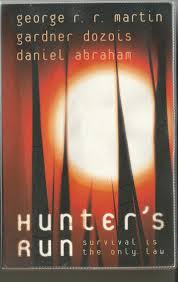The Vital Abyss by James S A Corey
The Vital Abyss is the most recently published instalment in The Expanse, another novella and possibly one of my favourite bits of writing in the setting. The authors try something a bit different here and explore the backstories of a group of characters who had seen pretty much irredeemably evil.
The Vital Abyss is told, unlike anything else in the series, in the first person, from the point of view of Cortazar, a researcher for Protogen who was partially responsible for the protomolecule test on Eros all the way back in Leviathan Wakes. After their capture by the OPA, they have been held for years in a small dormitory, entirely cut off from the outside world, desperate for any change of scenery and dangerously competitive for any potential opportunity. Alongside the main narrative, flashbacks fill in Cortazar’s backstory and explain how a seemingly affable young man reached the point of being able to slaughter an entire space station in the most horrific manner imaginable.
The titular ‘Vital Abyss’ is the necessary ability to separate yourself from other people to be capable of the kind of horrors Cortazar and his group are guilty of creating. They may have ambitions to save humanity from all future illness and suffering, but to put even a single human through the agony they do requires a mental re-adjustment and a sacrifice of basic empathy; the abyss of the title. The backstory for Cortazar is unlike anything else we’ve really seen in the series and is movingly told, although the actual jump from the sensitive young man seem in the flashbacks to the calculated and cold scientist in the present is done in a rather clunky and convenient manner.
There are some gorgeous turns of phrases in The Vital Abyss, which certainly feels like an experiment and a deviation from the usual formula. It’s the most floridly written piece in the entire series and this is actually done very well. With the main series tending very much towards being stale, it was a breath of fresh air to read Abraham and Franck doing something so different.
The Vital Abyss is joint with Gods of Risk four my favourite Expanse novella and one I definitely wouldn’t recommend skipping. Arguably the series has never really topped the horror of Eros Station so seeing this event returned to is a macabre pleasure.









